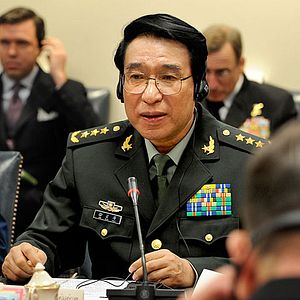November 14 marked the second anniversary of the day the 18th CCP Party Congress lowered its curtains. In those 730 days, Xi Jinping has shown himself to be a strong-willed leader whose anti-corruption efforts have made him immensely popular with the Chinese public. Chinese news outlets, whether state-sponsored or not, are lined with celebratory editorials congratulating Xi and the party center’s successful takedown of 56 “tigers,” as high-ranking officials charged with corruption are known. But setting the gleeful mood aside, it is obvious that one institution has so far avoided a large-scale crackdown: the Chinese People’s Liberation Army (PLA).
Regardless of the media’s praise of “Xi-style anti-corruption,” the Chinese leader’s tiger hunt in the military has to date been limited in magnitude and intensity. Of 56 tigers caught, only three were members of the PLA: Gu Junshan, the former deputy chief of the PLA General Logistics Department (the GLD is arguably the most corrupt agency in the PLA), Xu Caihou, the cancer-ridden former Central Military Commission (CMC) vice chairman, and most recently, Yang Jinshan, a member of the Chinese Communist Party (CCP) central committee and the deputy commanding officer of the Chengdu military region. Though there might be unspecified numbers of lower and mid-level officers who are among the 180,000 party members who received “disciplinary actions,” housecleaning among the PLA top brass has so far yielded only modest results. What is behind the gradualist approach to dealing with “tigers” in the PLA?
In fact, Xi has shown a degree of prudence when it comes to stirring the pot. In the latest all-PLA political work conference held at the historic site of the Gutian Congress (where Mao Zedong consolidated his power in the Red Fourth Army 85 years ago), Xi placed a much heavier emphasis on upholding the principle of “party commands the gun” than calling out venal men among the officer corps. Xi’s caution is unsurprising, because although the party controls the army, the army’s support is crucial in guaranteeing the CCP’s right to rule. The largest military force in the world, the PLA and its predecessors has been the faithful guardian of the party since 1927. Therefore, Xi must think carefully about how deep he wants to dig into the party’s own Great Wall. In addition, an extensive cleansing of the PLA establishment would severely undermine the morale of its servicemen, as well as the belief of many Chinese that the PLA is still a strict institution that soars above the corroding forces of nepotism, cronyism, and similar skullduggery.
Another factor working against Xi’s anti-corruption campaign in the military is the resistance put up by vested interest groups. Factionalism has been a feature of PLA politics since its earliest days. Leaders starting from Mao have repeatedly lashed out against shantou zhuyi, or “mountain peak mentality,” referring to loyalty and obedience to an individual (or “mountain peak”) instead of the party center. Today, the system of patronage and guanxi is alive and well in the military, which sustains interest groups that formed around towering “mountain peaks.” In an exclusive interview given to Hong Kong’s Phoenix Network, General Luo Yuan confirmed the existence of such powerful networks within the PLA and how it attempted to hamper the investigation of Gu Junshan. The apparent suicide of naval officer Ma Faxiang on November 14 is another somber episode that showed the pull of factional allegiance, which drove desperate individuals to choose death over betraying their master.
The tepid work attitude adopted by General Du Jincai – the head of the PLA’s Commission for Discipline Inspection, and the Politics and Law Commission – offers a revealing example of ongoing elite resistance against the anti-corruption storm. Unlike his civilian counterparts Wang Qishan and Meng Jianzhu, who have been breathing flames on decadent party apparatchiks, Du’s response to Xi’s call for a “cleaner” PLA has mostly been silence. A lifelong political commissar said to be a confidant of former CMC vice chairman Guo Boxiong, Du’s clout in the military must not be underestimated given the fact he now controls the PLA’s disciplinary and legal organs. While it is difficult to discern Du’s motives in ignoring the commander-in-chief, one may infer from this episode that dissatisfaction among the older generation of PLA generals regarding the anti-corruption clampdown is far from non-existent.
There are, however, visible changes being made in the military hierarchy that is shifting more power into Xi’s hands. On November 6, the CMC took over the PLA’s auditing office and incorporated it under the CMC’s direct management. Tasked with monitoring the military’s economic activities, the auditing office was originally part of the GLD. It struggled to do its job because it had to report to superiors in the GLD, the same department that produced rapacious “tigers” like Gu Junshan. Now, with a new and higher status, the auditing office will likely become a handy tool for CMC’s chairman Xi in cleaning up the PLA’s house.
Pursuing a reformist agenda in any rigid system is a formidable task, especially in the Chinese military, a bastion of conservatism. Nevertheless, Xi has decided to take on this daunting challenge with a full understanding of the risks involved. Two years into office, the CMC chairman’s anti-corruption moves targeting the military have largely been cautious and carefully measured. Yet that does not mean he lacks resolve in the face of obstacles. Although the “tigers” will not be willing to go down without a tussle, Xi appears determined to charge ahead.
Zi Yang is a M.A. candidate in the Asian Studies Program at Georgetown University and the current Managing Editor of the Georgetown Journal of Asian Affairs.

































